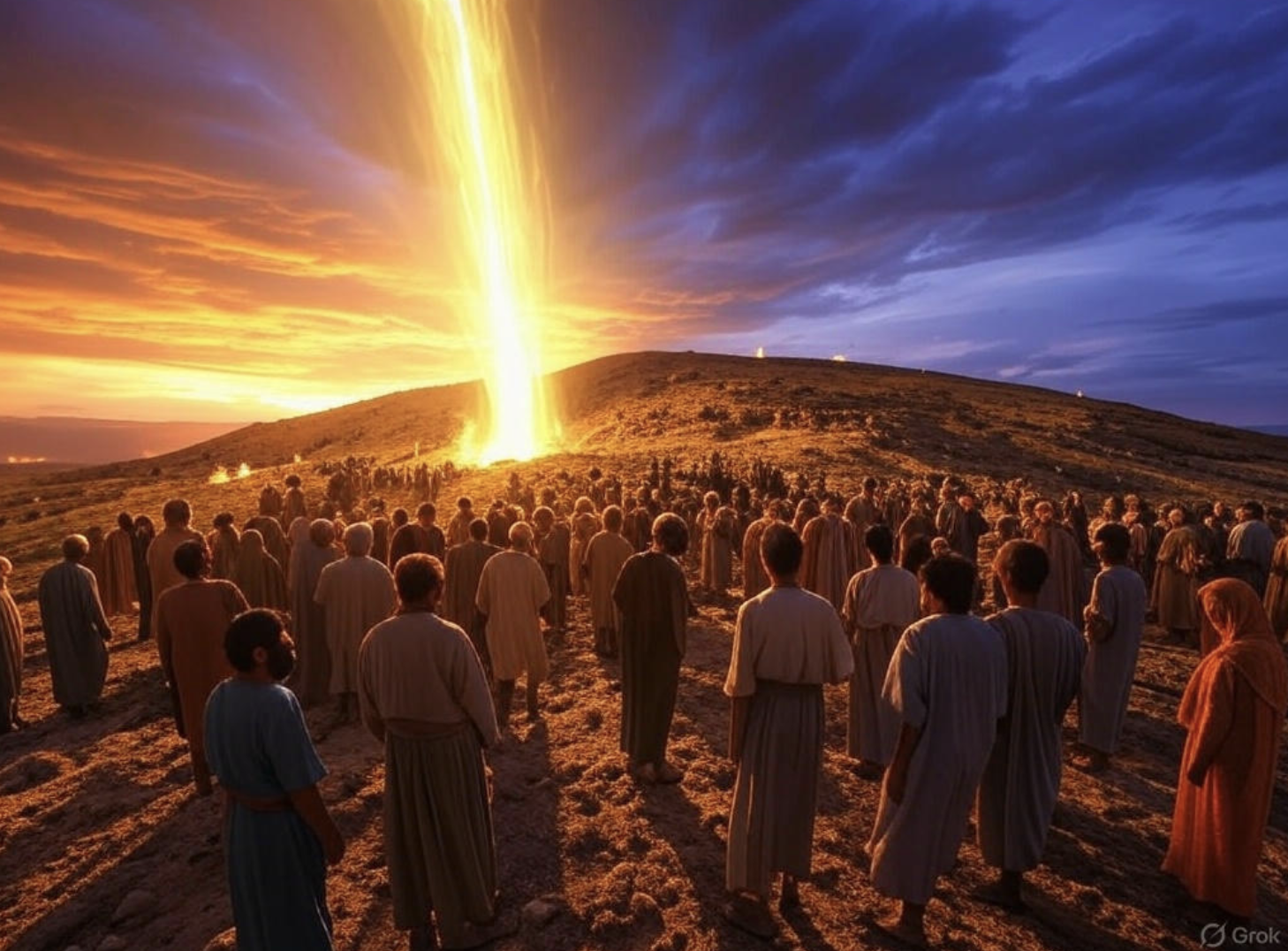Acts 1: Prophecy Fulfilled
Joel 2:28-32’s Spirit outpouring ignites in Acts 1:4-5, heralding the church’s birth.
The Book of Acts unveils a tapestry of Old Testament prophecy woven into the church’s dawn. Jesus’s Spirit promise (1:4-5) ignites Joel 2:28-32’s outpouring and Jeremiah 31:31-34’s new covenant, stirring hope—and tension—among apostles expecting Israel’s throne (1:6-7), a mystery Deuteronomy 29:29 reserves for God. The Great Commission (1:8) fulfills Isaiah 49:6’s light to nations, clashing with Jewish norms as gentiles join, sparking skepticism. The ascension (1:9-11) mirrors Daniel 7:13-14’s rise and Zechariah 12:10’s pierced gaze, stirring awe and resistance—many Jews reject a non-reigning Messiah. Peter’s call (1:15-26) to replace Judas with Matthias, rooted in Psalm 69:25 and 109:8, resolves early discord, steadying the Twelve. Acts 1 bridges ancient promises to a new era, its unstoppable faith rising amid rejection—Pentecost looms.
[Explore the Fire Within]
The Spirit’s Promise Foretold
Acts 1:4-5’s Spirit promise fulfills OT prophecy, igniting the church’s mission. Jeremiah 31:31-34’s new covenant, etched on hearts, transforms lives, while Joel 2:28-32’s outpouring brings prophecy and visions to all—young, old, male, female. Jesus’s command to wait in Jerusalem bridges these promises, launching the church at Pentecost with divine power. Yet, this universal call stirs tension—apostles expecting Israel’s throne (1:6) grapple with a broader vision, while Jewish leaders later resist the Spirit’s inclusive reach (Acts 2:13). This infographic connects these prophecies to Acts 1:4-5, revealing Jesus as the Messiah who fulfills God’s plan, setting a foundation for the church’s global witness despite early skepticism.
God’s Timing Promised
Acts 1:6-7 reflects Jesus’s reply to the disciples’ kingdom query, pointing to God’s timing per Deuteronomy 29:29—‘secret things belong to the Lord.’ This OT prophecy affirms divine sovereignty, redirecting the apostles from Israel’s restoration to a global mission (1:8). Yet, their throne hope sparks tension—expectations clash with God’s plan, foreshadowing Jewish leaders’ resistance to a Messiah who doesn’t reign (Acts 3:19-21). Jesus, fulfilling Messianic prophecy, shifts focus to trust in God’s unfolding purpose, as Daniel 2:21 echoes—He controls times and seasons. This infographic links Deuteronomy to Acts 1:6-7, showing how Jesus’s words ground the church in divine timing, preparing the apostles for the Spirit’s power despite early misunderstandings and opposition.
Mission to be Empowered by the Spirit
Acts 1:8’s commission—Spirit-empowered witnesses to the ends of the earth—fulfills Isaiah 49:6’s light to the nations and Isaiah 32:15’s Spirit from on high. Jesus shifts the disciples from Israel’s kingdom to a global mission, igniting the church’s reach with divine power (Acts 2:1-4). Yet, this inclusive call stirs conflict—Jewish leaders resist gentile inclusion (Acts 4:1-3), seeing it as a betrayal of tradition, while apostles face skepticism over a non-reigning Messiah. Jesus, the prophesied Messiah, fulfills Isaiah’s vision, launching a mission that reshapes faith across nations (Isaiah 66:18). This infographic connects these prophecies to Acts 1:8, showing how the Spirit empowers the church’s expansive witness, overcoming early opposition with unstoppable resolve.
The Ascension Foretold
Acts 1:9-11’s ascension fulfills Daniel 7:13-14’s Son of Man rising with clouds and Zechariah 12:10’s pierced one mourned. Jesus ascends, witnessed by disciples and affirmed by angels, anchoring OT prophecy—His return is vowed, launching the church’s mission (1:8). Yet, this Messianic sign stirs conflict—Jewish leaders reject a non-reigning Messiah (Acts 3:19-21), while disciples face awe and doubt (1:10-11). Jesus, the prophesied Messiah, fulfills these visions, as Psalm 110:1’s exaltation echoes, empowering the church with divine authority. This infographic links Daniel and Zechariah to Acts 1:9-11, showing how the ascension bridges OT hope to NT reality, igniting a mission that perseveres through opposition with unshakable faith.
Matthias Chosen by Prophecy
Acts 1:20 cites Psalm 69:25—‘let his homestead be desolate’—and Psalm 109:8—‘let another take his office’—as Peter addresses Judas’s betrayal, guiding Matthias’s selection (1:21-26). This OT prophecy restores the Twelve, fulfilling God’s plan for the church’s leadership before the Spirit’s arrival (Acts 2). Yet, Judas’s fall stirs conflict—his betrayal (Psalm 41:9) divides the apostles, while Jewish leaders later scorn their mission (Acts 4:1-3). Jesus, the Messiah, ensures continuity through this prophetic act, steadying the church for its global witness (1:8). This infographic links Psalms to Acts 1:20, showing how Matthias’s rise bridges OT justice to NT purpose, fortifying the Twelve amid early tensions for an unstoppable mission.

